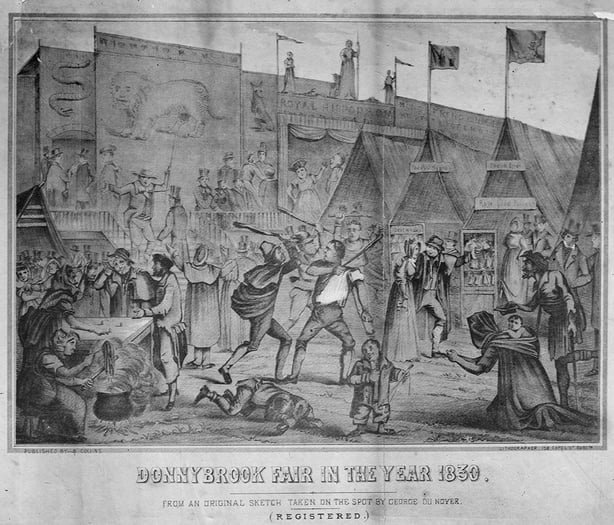A song about a fair with a reputation for brawling and carousing held at Donnybrook in Dublin.
The fair in Donnybrook was established in 1204 by the Normans to thank the citizens of Dublin for their help in building the walls of the city. Held on land in Donnybrook next to the river Dodder, it endured for centuries and was a permanent and popular fixture in the city calendar every August.
The fair was well known throughout Ireland, and over time gained a certain amount of notoriety. During the eighteenth and nineteenth centuries, the well-to-do residents of Donnybrook and members of the upper classes frowned on the entertainment, customs and behaviour of the fair and the people who attended it.
Writer and broadcaster Seán J White explains, the gentry at that time become evangelical in religion, and
They wanted to impose this evangelism particularly on the lower classes.
Donnybrook Fair is well documented in travelogues of the eighteenth and nineteenth centuries. The festival was a popular destination for tourists in Ireland during the summer months. They describe a chaotic atmosphere where the rules governing day to day life were absent.
Others ate, screamed, shouted and fought.
Frank Harte sings the nineteenth-century ballad 'The Humours of Donnybrook Fair’ which paints a colourful picture of the event.
There are dogs a-dancing and wild beasts a-prancing
With neat bits of painting, red, yellow and gold
Toss players and scramblers and showmen and gamblers
Pick-pockets in plenty, both of young and old
There are brewers and bakers and jolly shoemakers
With butchers and porters and men that cut hair
There are mountebanks grinnin’, while others are sinnin’
To keep up the humours of Donnybrook Fair.
This episode of ‘The Humours of Donnybrook’ was broadcast on 20 December 1978. The presenter is Ciarán Mac Mathúna.
'The Humours of Donnybrook' was a series of traditional Irish music programmes presented by Ciarán Mac Mathúna and produced by Peter Canning.

Copy of a sketch by George Du Noyer depicting events at Donnybrook Fair, Dublin, 1830. From the Cashman Collection, RTÉ Archives.






























